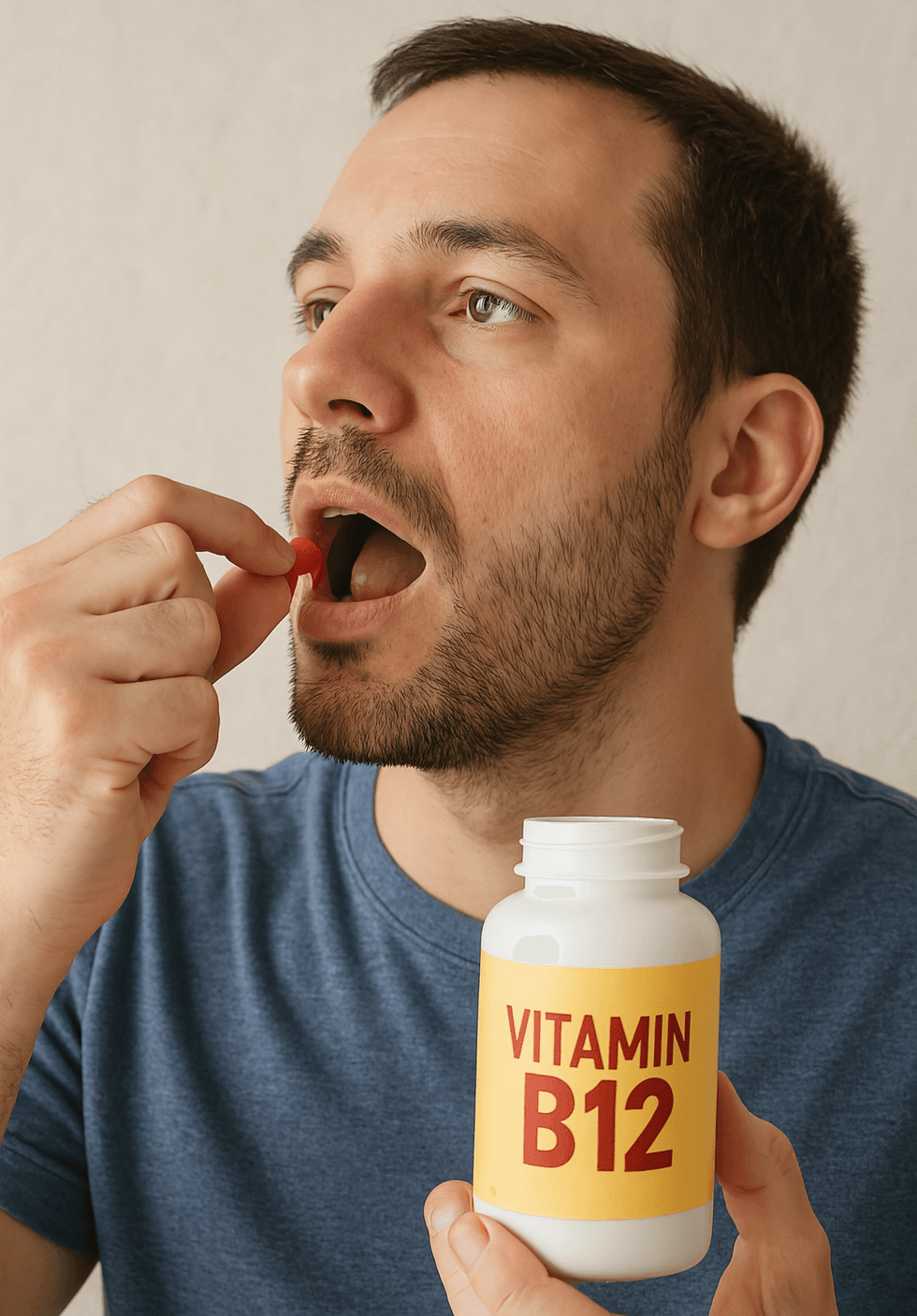Quick version
Taking a B12 supplement isn't always enough – especially if your body has trouble absorbing the vitamin on its own. To be effective, you need to choose a form that your body can easily absorb, avoid factors that inhibit absorption, and ensure that other nutrients like folate, B6, magnesium, and iron are in adequate levels. By understanding how absorption works and adapting your strategy, you can effectively boost your B12 levels and improve your energy, concentration, and overall health.
B12 is essential for the body to produce energy, build blood cells and keep the nervous system in balance. When levels drop, it can lead to symptoms such as brain fog, tingling skin, dizziness and fatigue that cannot be relieved by rest – even if you take supplements every day. According to several guidelines, B12 levels in the blood should be above 400 pmol/L to be optimal. Concentrations below this, in combination with symptoms, can signal a deficiency.
When B12 is not absorbed – despite supplements
B12 deficiency is more common than many people think – especially among the elderly, vegans, people with stomach and intestinal problems or those using acid-reducing medications. But what do you do when you are already taking supplements and still can't get your levels up? In many cases, the problem lies in the absorption itself. The body can have difficulty absorbing the vitamin, especially if the intestines or stomach are not functioning optimally. In this guide, we'll go over why this happens, how to choose the right form of B12, and what factors can help your body absorb and use the nutrient more effectively.
Choose the right form of B12 – not all supplements work equally well
In the case of B12 deficiency, the form plays a big role. Many supplements contain cyanocobalamin, a synthetic and stable form of the vitamin that requires good stomach acid and a substance from the stomach called intrinsic factor to be absorbed in the intestine. This often works for healthy individuals, but is far from optimal for those who already have a deficiency or have difficulty absorbing nutrients through the stomach or intestine.
A better alternative in the case of deficiency is methylcobalamin, which is the biologically active form that the body can use directly. In addition, there is also hydroxocobalamin, which is the variant that is most often given via injection in healthcare and has a longer half-life in the body.
Today, there are also a large number of brands and products to choose from, both in pharmacies, health food stores and online. You can find B12 as tablets, lozenges, capsules and oral sprays. Many brands combine B12 with folate and B6, which can be an advantage because these nutrients work together in the body. Other supplements are purer and better suited for those who want to adjust doses themselves.
Tip: If you have stomach problems or suspect that you are not absorbing nutrients properly, choose a B12 supplement that is absorbed directly through the mucous membrane – for example in the form of a lozenge or oral spray. This means that you bypass the intestine completely, which can be much more effective in cases of deficiency.
Avoid absorption inhibitors – protect the stomach
Many people unknowingly walk around with low stomach acid, either due to age, stress or medications such as omeprazole. This makes it difficult to release B12 from food. Intestinal diseases such as celiac disease, Crohn's and IBS can also negatively affect absorption.
Combine with the right nutrients
For the body to be able to use vitamin B12 in the best way, it is not always enough to just replenish B12 in itself. Several other nutrients are needed to support the processes in which B12 is active. If you are deficient in any of these, the effect of your B12 supplement may be weaker than expected. Below are some of the most important interacting nutrients.
- Folate (B9) - Works with B12 in the so-called methylation cycle, which affects the cells' detoxification capacity, DNA synthesis and nerve function. Folate deficiency can mask or worsen B12 deficiency and vice versa.
- Vitamin B6 - Important for converting amino acids and producing neurotransmitters. B6 works with B12 and folate in the breakdown of homocysteine - a process that is important for both the heart, blood vessels and brain.
- Magnesium - Required for over 300 enzyme reactions in the body - including several where B12 is involved. Without sufficient magnesium, the cells' energy metabolism does not function optimally, even if B12 levels are good.
- Iron - Iron deficiency is common in long-term fatigue, and it often occurs together with B12 deficiency, especially in menstruating women, vegetarians and people with gastrointestinal problems. Iron is needed, among other things, to form red blood cells – a process that is also dependent on B12.
Split the dose or increase your strength
If you suspect or know that you have a B12 deficiency, it is therefore wise to also check the levels of folate, B6, magnesium and iron. A supplement that combines several of these nutrients can sometimes give faster and more noticeable results. The body can absorb a small amount of B12 passively – even without intrinsic factor. This means that higher doses (e.g. 1000 µg/day) can work orally even in cases of absorption problems. In severe cases of deficiency, B12 injections may be needed for a period of time to quickly replenish the stores.





















